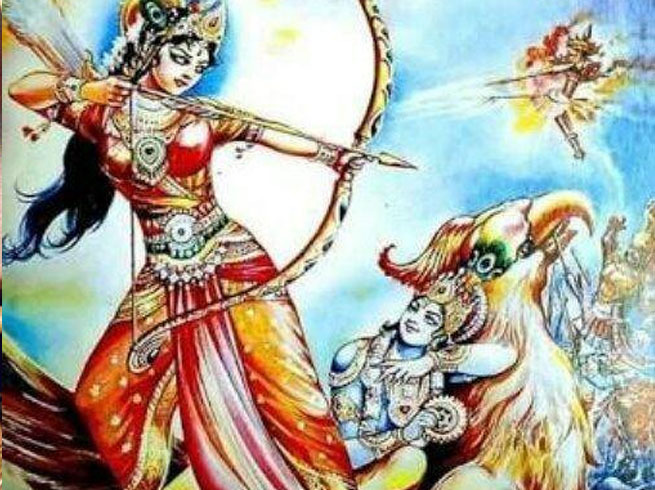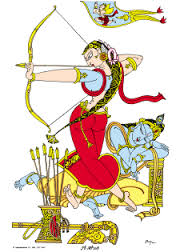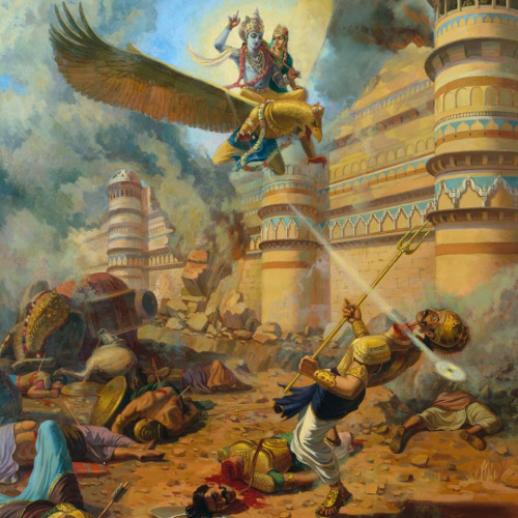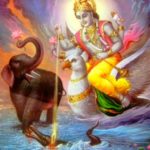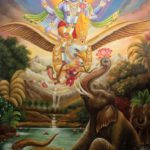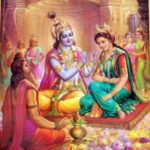The following Post concludes our Series on Narasaraju garu’s Book on Bhagavatamu.
Completing our Series of Articles on the translation of Telugu Bhagavatam by Professor T.S.B. Narasaraju of Banaras Hindu University, is Excerpt IV. Those interested in reading Excerpt I of our series can find it here, Excerpt II here and Excerpt III here.
With Excerpt IV, Narasaraju garu has completed the impressive feat of translating the entire Dasama Skandha of Pothana Mahakavi. Please encourage and support this endeavour by circulating this spiritual work, especially to our Telugu youth.
Excerpt 4 is based on Part III of the English Translation of Potana’s Bhagavata Purana (Dasama Skandha), and can be found here.
Publishers interested in printing or offering e-Publication of Narasaraju garu’s work can reach him via email at shamraan@gmail.com
Click here to download Part I of the English Translation of Potana’s Bhagavata Purana (Dasama Skandha)
Click here to download Part II of the English Translation of Potana’s Bhagavata Purana (Dasama Skandha)
Part IV Excerpt
12.Satyabhama Fighting with Narakasura
King Parikshit asked sage Suka, “Why did Krishna kill Narakasura, a beloved son of goddess Earth? Why did Narakasura imprison those handsome girls in the prime of their youth (149)?” Sage Suka said to Parikshit that Narakasura stole earrings of Aditi, umbrella of lord Varuna and Maniparvata of Devatas. He mentioned, in addition, that Devendra narrated to Hari the atrocities committed by Narakasura. While Hari got up Garuda-Vahana and was about to start to kill Narakasura, Satyabhama uttered the following words (150):-
“Oh! Lord! I have a desire to see your dexterity while you excel on the battle-field in slaying clusters of demons. My beloved lord! Please have consideration for my request and kindly take me along with you! I see with my own eyes the valour exhibited by you there and narrate it to all the queens here (151).” The lord then said the following words to his sweet-heart:- “My beloved! What for is a battle-field for a tender one like you? What you hear there are not the buzzings of intoxicated Tummedas but trumpeting of fearful elephants. What you see there are not pollen grains from gardens having lotuses but dust particles raised by hoofs of horses.What you see there are not droplets from waves of water but clusters of arrows let loose from bows of enemies. What you see there are not lakes full of swans but formations of armies of foes. You do not see lotuses and lilies there but fearful spears, swords and other weapons of enemies. Why do you desire to come to such a battle-field? I return quickly. You stay back! Abstain from following me (153)!”
To those words of her life-partner she replied sweetly as follows approaching him with folded hands, tender as flowers, while the lord was glancing at her appreciatively:-“Why should I be scared of even clusters of demons as long as I am under the protection of your competent hands comparable to fortresses impenetrable to foes (154, 155)? Lifting such an imploring Satyabhama with his hands, Hari got her seated on Garuda-Vahana along with himself and flew to a city named Pragjyotishapura full of fortresses impregnable to rocks, arrows, air, water and fire. The city was further fortified by the inter-twining of chords of demon Murasura (156).
With blows by his mace the lord shattered the boundary walls and war-machines of the city causing shudders in the hearts of the demons. Then the great lord blew his conch, Panchajanya, capable of throwing all the three Lokasinto a faintby its terrifying sound comparable to that of a thunder devastating the whole universe (159). Hearing that dreadful sound capable of causing a total annihilation of entire creation, the five-headed demon Murasura woke up from his slumber. He yawned, came out from water and stretched his limbs. He saw Hari and approached the lord like a devastating conflagration. His terrifying appearance made it impossible for people to look at it. He was shouting loud causing a shudder all around. His five mouths were giving an impression that they were attempting to swallow all the Lokas constituted by the primordial elements, Panchbhutas. He flung his mace plaited with fearful flames at Garutmanta letting loose a shriek causing tremors both on heaven and earth (160).
The demon approached Hari shouting arrogantly asking him to stop. Hari, in turn, felt that the anxiety of Devatas was to be eliminated from that day (161). At that time Mukunda seizing midway the mace thrown by Murasura at Garuda, broke it into three pieces. He then shot sharp arrows at the demon (162,163).The demon threw his mace at Hari, who reduced it to splinters using his own mace. The lord then saw the demon approaching him quickly withraised hands and cut his five headseffortlessly with his Chakrayudha (164).Murasura with heads severed by Chakri`s weapon collapsed into water like a mountain crumbling with hill tops smashed by Devendra`s Vajrayudha. Then seven sons of Murasura got enraged seeing the death of their father and started for a fight announcing that they would kill the lord. Motivated by Narakasura like Pavanasaptaka being sent by Kalantaka at the time of Pralaya, a total annihilation of all creation, the seven demons by names, Tamra, Antariksha, Sravana, Vibhavasa, Vasu, Sabhaswanta and Aruna came to war with Pitha as their army-head. They threw at Hari weapons like maces and swords, among others, (165).The lord with valour made all the weapons thrown by those demon-warriors crumble to the ground. In return he sent an incessant volley of arrows which reduced hands, legs and throats of the demons into pieces as small as the seeds of sesame (166).
Narakasura was astonished and angered at the death of his people under the relentless attack of Hari through arrows and Chakrayudha. He uttered insulting words addressing the lord and did self-praise. He wore earrings and other ornaments. He started for the battle-field along with clusters of elephants with imposing trunks, temples and cheeks moistened by oozing fluids (167). The son of goddess Earth saw the lord adept in war-fare and radiant with a blue skin colour. He saw an effulgent Hari seated on the back of Garutmanta along with Satyabhama comparable to a cloud with a lightning covering the surface of the moon. Wearing anarrow-container on his back, the lord was explaining to the daughter of Satrajit the intricacies of war-fare (168). Narakasura was getting ready for a fight with such a Krishna. Satyabhama saw that and came at once to the front without any delay (169). She fastened hastily her hair dangling on her back. She tightened the knots of her robes. She arranged her ornaments appropriately. She kept her upper robe in position. With her moon-like countenance radiating brilliance and eyes comparable to those of a deer, she stood fearlessly in the vicinity of her lord (170).
13.Krishna and Satyabhama Killing Narakasura
Madhava, the best among Yadavas, observed Satyabhama ready to humble the pride of demons on the battle-field and spoke charmingly (171). (Oh! Lady)! Am I not competent to win over the demons? Why are you getting ready to fight? Come here and abstain from it! In case you still decide to fight, take up this bow of mine playfully (172).Having spoken those words, Hari gave to Harinakshi, the lady with eyes similar to those of a deer, his bow capable of overcoming the pride of foes. That act of the lord caused jubilation to Devatas and gloom to the demons (173,174). She held that bow in hand and derived consequently immense strength. She was radiant as a personification of immense valour. With a zeal to fight, she tightened the string of the bow and stretched it. The sound thus produced loosened knots of Mangalasutras of wives of demons implying thereby that death of demons was approaching (175). In addition, that sound created a scare in the enemy camps leading to their elephants and other animals getting fainted (176).
Tinkling noise of her golden bangles got mingled up with the sound of the bow-string. Dazzling of her earrings got reflected on the radiance of her cheeks. Shine on the arrows was submerged by the effulgence of her side-glances. Sounds produced by the speed of her arrows overcame the sounds of the armies of the foes. Veera, Sringara, Bhaya, Raudra and Vismaya Rasas seemed to have collectively taken the shape of that lady since the acts of putting arrows in the bow, stretching and releasing were done so fast that a discrimination of them became impossible. That was the pace of her movements during the fight (177).With her countenance as a moon, she was inflicting pain on Narakasura by shooting sharp arrows. In the process she intertwined her eye-brows in anger making her eyes red as a personification of valour. At the same time, she was causing pleasure to her beloved by glancing at him smilingly with her beautiful eyes exhibiting love for him and appearing as an embodiment of grace (178). She was looking radiant while killing the foes. She was releasing arrows from a circular bow with her left foot put forward and the right foot bent. Her face with locks of hair was wet with sweat. She was stretching the string of the bow upto her ear emanating shine of nails of her fingers while shooting arrows aiming at her foes and killing them (179).
How did a simple woman, who used to avoid going even to playful marriages of dolls, think of coming to a war-field? How did a tender woman, who used to hide herself on seeing males, think of winning over foes? How did a woman, getting terrified even to get up a golden cradle, ascend the back of Garuda? How did a fun-loving girl, not tolerating even the hubbub of her companions, withstand the war-trumpets? She used to get tired even by teaching the art of dancing to peacocks because of her delicate physique. How could such a weakling dare to put an end to the pride of foes by putting her left foot forward and bending the right food during fight? The whole event was a great miracle (180). How could a woman unskilled, even to hold a Veena properly, negotiate with a bow? How could a girl, incapable of making a creeper get bound to trunk of a tree, tie a string to bow? How could a tender woman, inefficient in making a garland of pearls by putting them together on a thread,put arrows in a bow? When did such a handsome woman, incapable of even teaching poems to a parrot, learn Mantras to be recited at the time of shooting Astras? How could an innocent girl, reserved in talking in spite of repeated requests from others, make sounds like roaring of a lion? Those were thoughts of onlookers of battle-field observing Satyabhama, endowed with virtues acclaimed by all the three Lokas (181). Satyabhama`s fight was compared to the on-set of rain. Sound of her bow-string was like a thunder. Devatas watching her fight were like Chetaka birds in the sky. Her bow was like a rain-bow. Krishna was looking like a dark cloud. She herself was appearing like a lightning. The volley of arrows sent by her was like rain-water. Demons were compared to a forest-fire implying that the act of fighting by her was a rain to extinguish such a fire (182)
She was propagating Sringara-Rasa to Hari and Veera-Rasa to the demon. Her charming face was appearing simultaneously as full-moon and sun; her upper robe as a flag of Manmadha and a source of fire; her circular stretched bow as a halo of Manmadha and a halo of a devastating conflagration; seeing her was like a flow of nectar and a spreading fire and her volley of arrows as a source of happiness and anger (183).The arrows thus shot by her, who was radiant as a tender creeper, sapped all the energy from army camps of the demons. Consequently, the soldiers retreated and took shelter away from the war-front (184,185).
The killer of Kamsa glanced, at his sweet-heart, exuding happiness and grace.With an intention of diverting her from her preparation for a fight with the demon, the lord started to talk with her pleasantly as follows (186). After speaking thus, he took back the bow from her hands, tender like fresh leaves. During the process, he talked to her in such a way that her mental fatigue was removed, praise was showered on her in a pleasing way (187).
Narakasura, the enemy of Devatas, told the enemy of demons, Murari the following words (188):- “It does not add to your stature if you abstain from a fight and remain silent when a woman exhibits valour before men. The valorous among demons are not enthusiastic about fighting against women (189).” Hari replied as follows:-“Oh! Narakasura! Do not be in a hurry! Through a volley of my arrowsI put an end to your fearful appearance by tearing you off. Devakantas are to rejoice today witnessing this event (190,191). So saying Hari let loose an Astra known as Sataghni on the soldiers of Narakasura. They were all seriously affected by it (192). Horses in huge numbers were torn asunder by arrows while the elephants crumbled when mighty blows by maces were inflicted on them.The exuberance of lord`s Chakra mutilated the soldiers severing and scattering theirlegs, hands and heads. Thus the army camps of Narakasura wore a pathetic appearance incapable of standing before the lord, moaning, sighing in extreme agony and running away (193).
Oh! King Parikshit! Clusters of Sastras let loose by fighters of the demonswere competently immobilized by the lord in air itself by shooting counter-arrows in triplets (195). Garutmanta, in turn, scattered all the elephants of the army camps using his sharp nails, pointed beak and blows by wings while carrying Krishna and Satya on his back (196).The gale generated by swinging of Gruda`s wings was unbearable to the surviving soldiers and madethem run away to the city. Seeing that Narakasura let loose on Garuda a weapon by name, Sakti which could counter Devendra`s Vajrayudha earlier.That had no effect on Garuda like the blow of a flower garland on an elephant. Naraka, seated on an elephant, proceeded forward in the war-field (197). Narakasura, on the back of a huge elephant, was about to throw his spear at Chakradhari. Before it happened, the lord, destroyer of demons, let loose his Chakrayudha, which killed countless number of notorious demons earlier. It severed the head of Narakasura studded with earrings full of costly stones (198). Narakasura collapsed on the earth below as if to ridicule goddess Earth that the lord did not spare him in spite of the fact she was his consort in an earlier Avatara, as was spoken by her (199). Devatas and ascetics showered flowers from heaven heaving a sigh of relief that they saw with their own eyes death of Narakasura and that they were saved (200).
14.Bhudevi Praising Krishna
Then goddess Bhudevi came to Krishna and presented to him golden earrings studded with costly stones, a flower-garland known as Vyjayanti, an umbrella presented to her by Varuna and a costly diamond. She saluted him and praised him as follows (201):-
“Oh! Parameswara! You are an embodiment of all living beings! You are incomparable with anything else! You have alotus in your navel. You have eyes comparable to lotuses. You wear a garland of flowers.You have a lotus-shaped countenance. You are a personification of unending power. You are a son of Vasudeva. You are the best among Devatas. You are capable of assuming whatever shape your devotees desire. You are the primordial being. You are the genesis of all.You possess incomparable knowledge. You are father of Brahma. You have no birth. You are supreme. You are all-powerful. You have an unending history. I salute to you endowed with all these attributes (202). You assume Rajoguna to create all the Lokas, Satvaguna to protect them and Tamoguna to destroy them. You are an embodiment of time being a Kalatma and Kalatita. You are the best among all. Myself being earth, water, fire, air and sky; sense of touch, seeing, taste and smell; Indriyas; Devatas, mind; one who does diverse types of acts; supreme reality and movable and immovable objects of creation are all embedded in you since you second to none (203).
Oh! Donor of what all is desired by your devotees! Saviour of the helpless! Please look at us with grace! This boy is a son of Naraka. He is scared of looking at you. He has no one to take care of him. He is in distress. He has no place of safety. He is not valorous like his father. He wants to take shelter at your feet.Thus Bhudevi saluted to Hari and worshipped him with words comparable to flowers. The lord having immense love to his devotees, being thus worshipped, assured protection to Bhagadatta, son of Narakasura and gave him all forms of wealth. Later the lord entered the palace of Narakasura (205).
kare rajulu rajyamul kalugave
garvonnatin pondare vareri?
siri mutakattukuni povan jalire
bhoomipy preinankalade?
sibi pramukulun preetin yasaha kamuly eere korkelu?
varalan marachire ikkalamun Bhargava?
Men acquired kingdoms and became kings in the past. They got conceited. Where are they now?
Could they bundle up their wealth and carry with them when they departed? Are their names remembered at least now?
Great persons like King Sibi generous and magnanimous in fulfilling wishes of the needy.
Consequently their names are remembered forever
Excerpt 4 is based on Part III of the English Translation of Potana’s Bhagavata Purana (Dasama Skandha), and can be found here.
Disclaimer: This book represents the opinions of Author, and should not be considered a reflection of the views of Andhra Cultural Portal. The author is responsible for ensuring the factual veracity of the content, herein.
Copyright: T.S.B.Narasaraju. All rights reserved. 2018.
